Amid Baghdad embassy attacks, US spending on diplomatic security drops 11%
Protesters stormed the US Embassy in Baghdad on Tuesday, following airstrikes carried out by American forces against the pro-Iran militia Kata’ib Hezbollah which killed 25 of its fighters and injured 50. US officials said the strikes came in response to a Kata’ib Hezbollah rocket attack near the Iraqi city of Kirkuk by that killed a US contractor and injured four US soldiers.
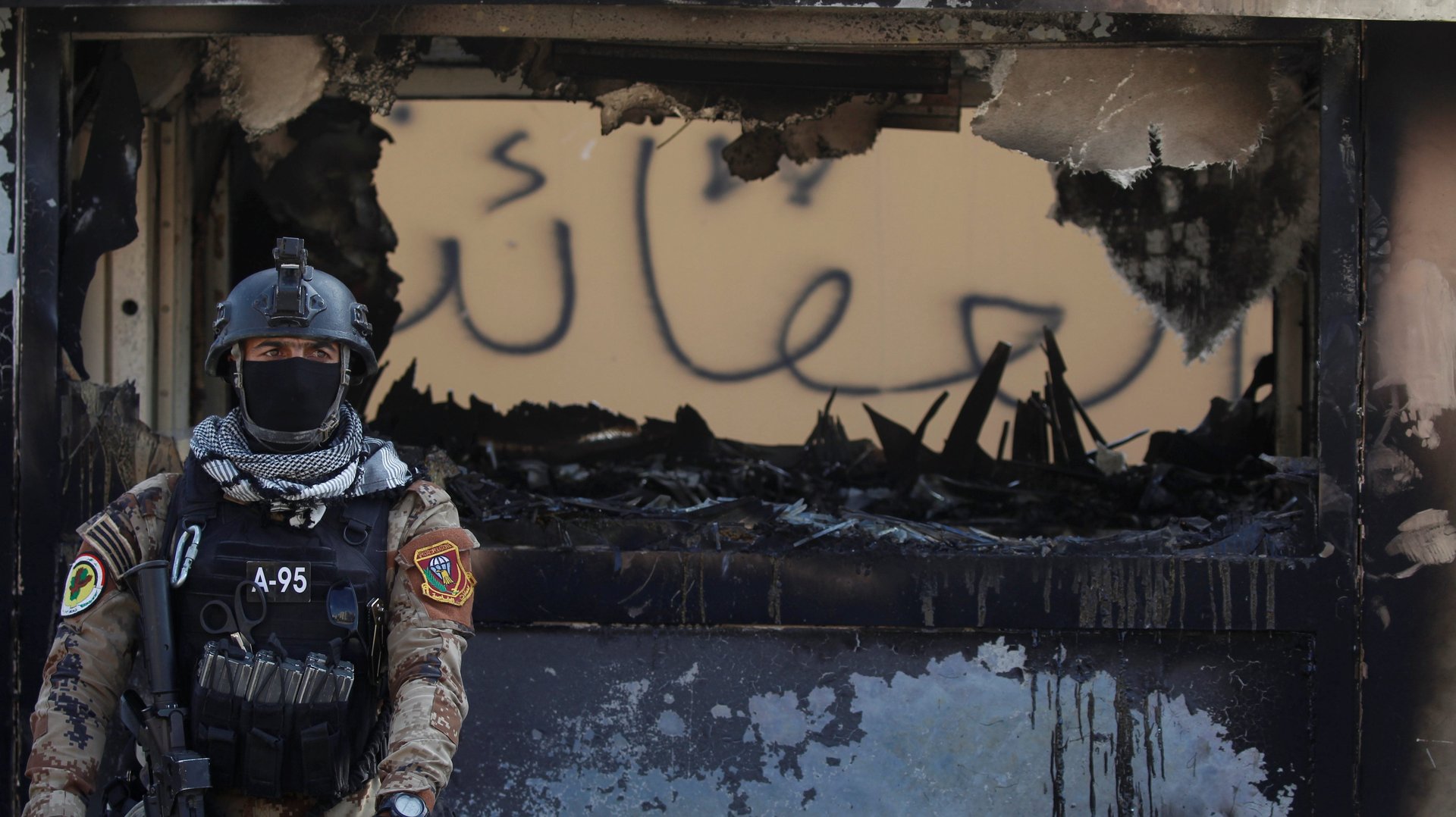

Protesters stormed the US Embassy in Baghdad on Tuesday, following airstrikes carried out by American forces against the pro-Iran militia Kata’ib Hezbollah which killed 25 of its fighters and injured 50. US officials said the strikes came in response to a Kata’ib Hezbollah rocket attack near the Iraqi city of Kirkuk by that killed a US contractor and injured four US soldiers.
The US Embassy compound in Baghdad is the world’s largest, comprising more square footage than Vatican City. However, its staff has been downsized dramatically over the past several months, amid the increasing threat of violence by Iranian-backed militias like Kata’ib Hezbollah.
Demonstrators breached the embassy compound’s perimeter walls, forcing their way into a CAC, or Compound Access Control facility, and setting fires on the property. As night fell, the crowd’s anger showed no signs of abating. People threw molotov cocktails onto embassy grounds, while American diplomats huddled in safe rooms inside.
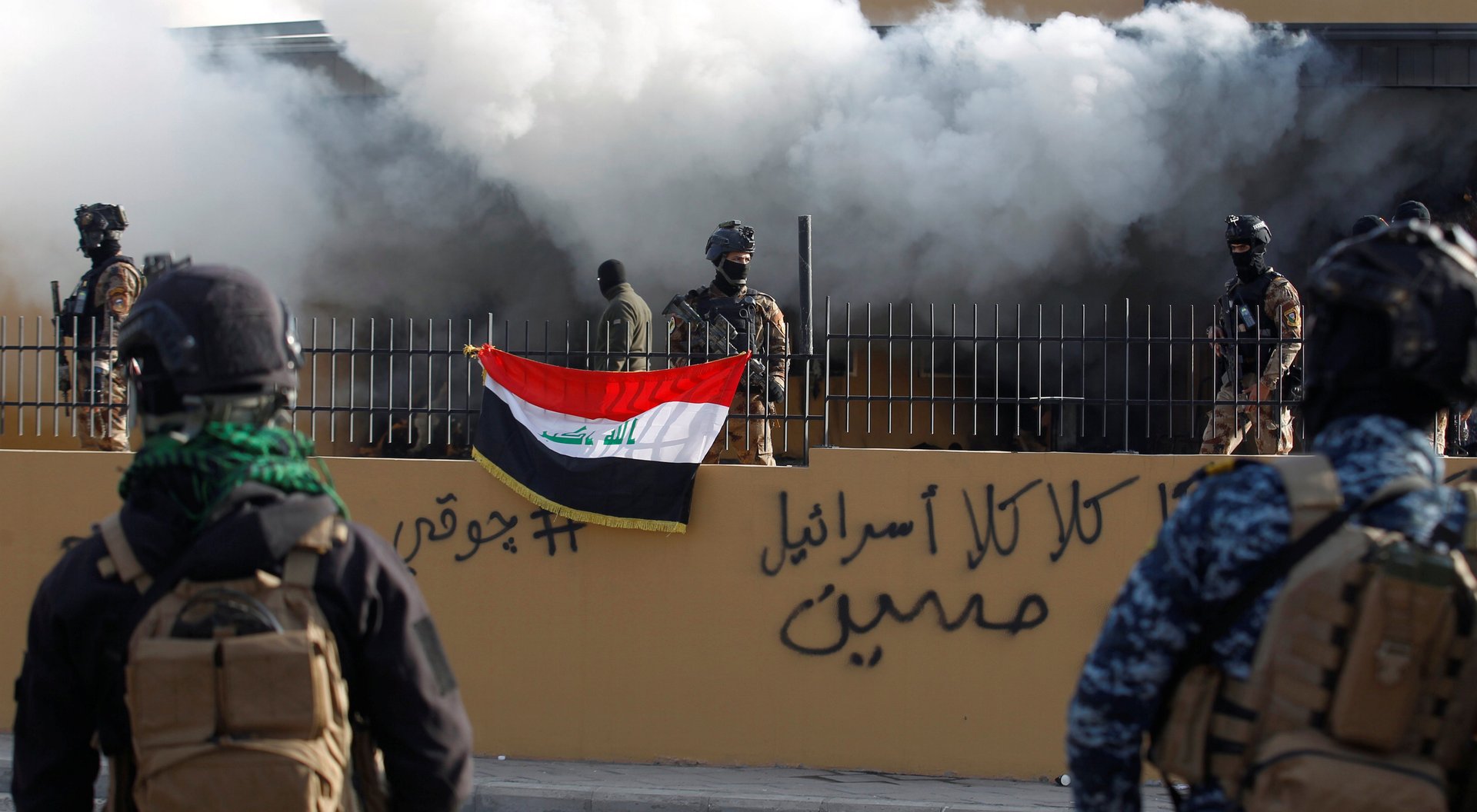
Additional US forces were sent to Baghdad to support Iraqi soldiers on the scene, the Pentagon said. Still, administration officials told CNN they were “very concerned” about the situation continuing to escalate further.
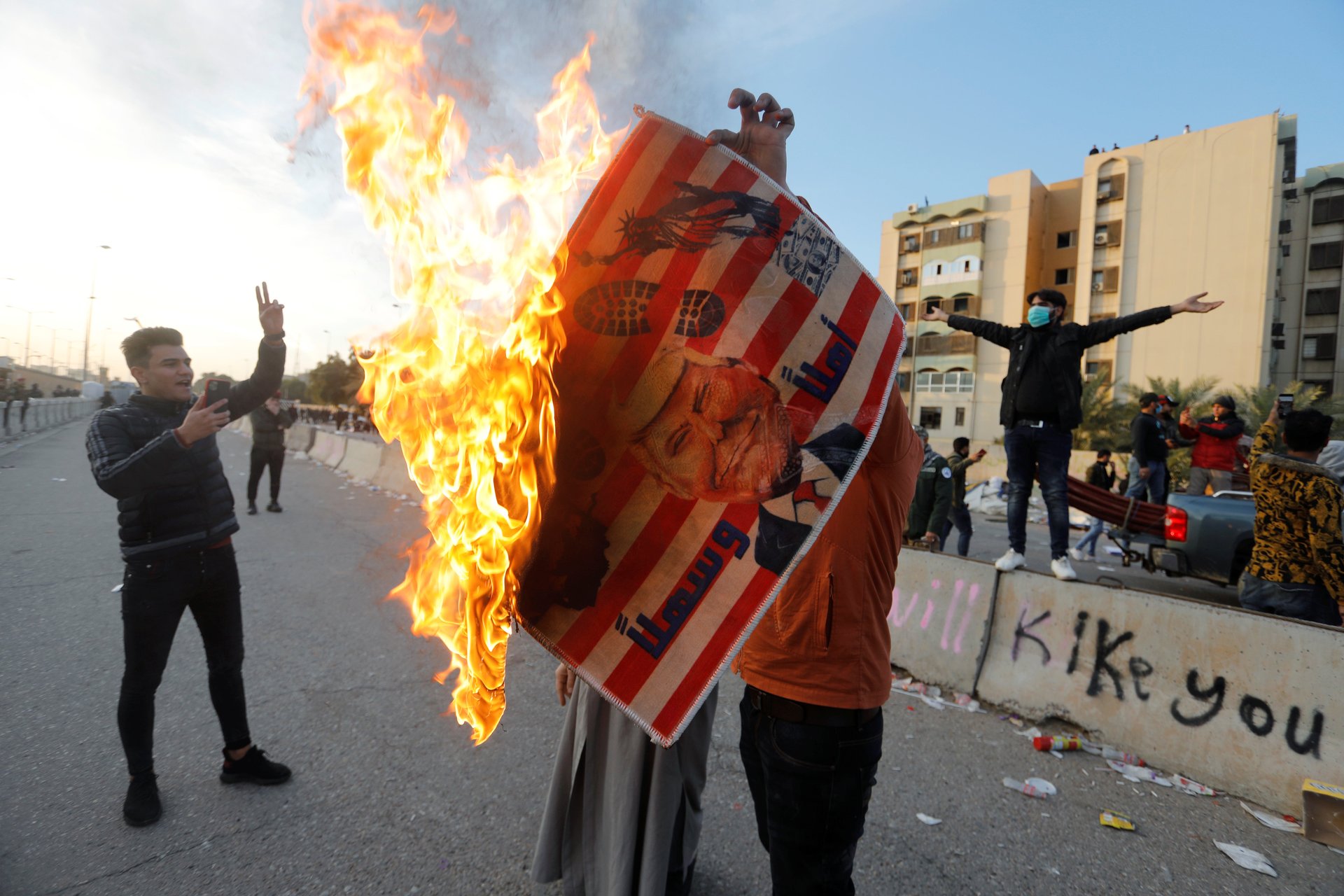
But although US senator Lindsey Graham, a South Carolina Republican, said US president Donald Trump has “acted decisively in the face of threats to our embassy in Baghdad,” the Trump administration has in fact cut the diplomatic security budget by hundreds of millions of dollars. This, says Brett Bruen, who served as a diplomat in the Obama administration, including a posting to Iraq, has made US foreign service members in places like Baghdad less safe overall.
“Spending on embassy security went down 14% last year, and they’re proposing another 18% cut this year, which to me seems like a huge story,” Bruen told Quartz. “The administration has been essentially weakening our defenses and what we saw play out yesterday a was in part a result of that. We have not been doing enough to fortify our diplomatic posts, especially with the kind of situation we have in Iraq—they never should have gotten that close. It’s just alarming on so many different levels.”
The diplomatic security budget did indeed drop precipitously during the past two years, as evidenced by this chart from the US government’s fiscal 2019 budget plan, which shows an 11% cut to overall diplomatic security in fiscal year 2020, with 18% specifically cut from embassy security, construction, and maintenance:
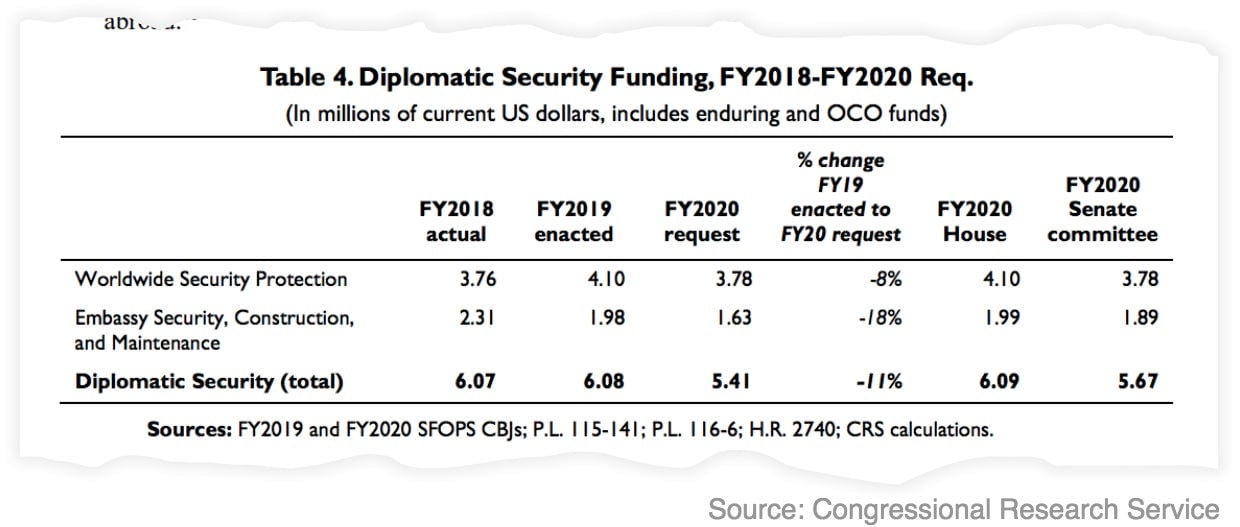
The Trump administration’s cuts came on top of previous ones by Republican legislators, which began in 2011. Diplomatic security budgets continued to decline, at the insistence of GOP lawmakers, even after the US embassy in Benghazi, Libya was attacked in 2012.
When secretary of state Mike Pompeo defended the State Department’s budget request before the House Foreign Affairs Committee last May, Rep. Gregory Meeks, a New York Democrat, challenged the Trump administration’s position on the subject. The cuts included a $50 million reduction in diplomatic security operations in Iraq “due to the suspension of operations at the U.S. consulate in Basra,” the budget proposal explained. In the summer of 2018, the State Department evacuated US personnel and temporarily closed the American consulate in the port city after both the consulate and embassy compound in Baghdad were hit by attacks attributed to Iranian-backed forces.
Pompeo told Meeks that diplomatic security “is not about dollars and spending,” but rather, “being thoughtful about where you put people.”
As is his wont, Trump took to Twitter after the attacks in Baghdad, saying he would hold Iran “fully responsible for lives lost, or damage incurred, at any of our facilities.”
“They will pay a very BIG PRICE!” Trump wrote. “This is not a Warning, it is a Threat.”
Despite Pompeo’s self-described “swagger” and Trump’s online bluster, Bruen said the amount spent on diplomatic security is still going down, “and that does have some real impact on what we can do to address some of the emerging threats. It’s pretty shocking; they’re not incremental decreases.”
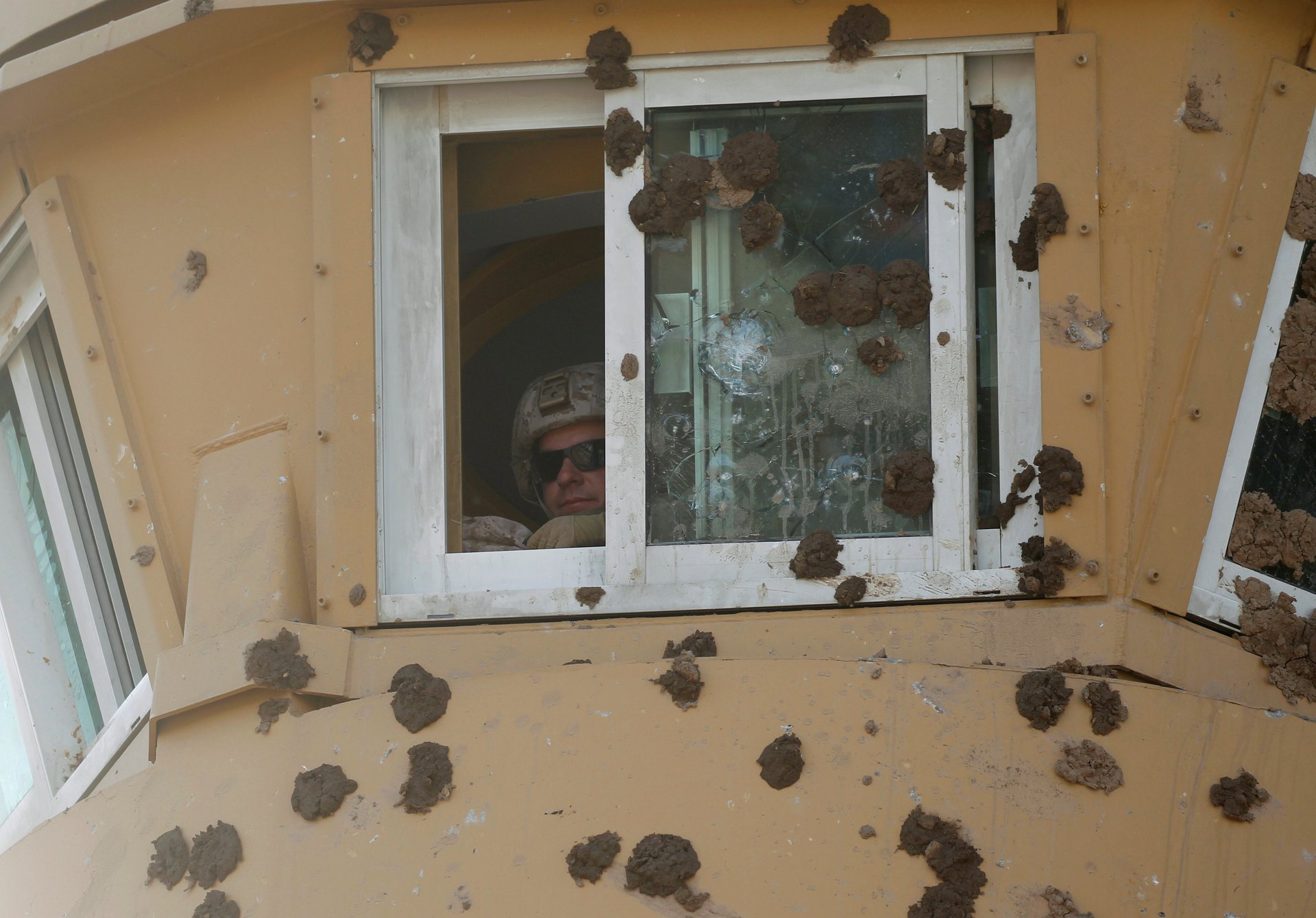
Bruen is also concerned about the long-term effects of the US response to Tuesday’s embassy attack.
“The decision to retaliate in the way that the US did, with no plan, no permission from the Iraqi government, and no preparation to protect our own people, is a really dumb version of diplomacy,” he said. “It sabotages our efforts not only to push the Iraqis farther away from Iran’s influence, but on counterterrorism efforts it will be much harder for Iraq to lend support, whether it’s going after ISIS or countering the next threat. When we violate their sovereignty, when we embarrass them on the world stage, this is not going to make us safer and ultimately pushes the Iraqis, as well as others, closer to Iran.”